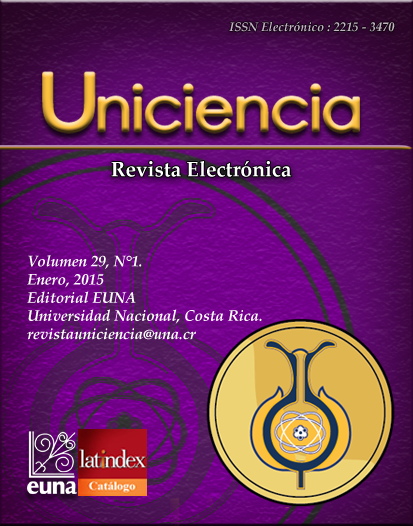Application of Mathematical Modeling Activities in Costarican High School Education
DOI:
https://doi.org/10.15359/ru.29-1.3Keywords:
mathematical modeling, problem solving, methodological strategy.Abstract
This paper describes the experience gained in implementing mathematical modeling activities as a methodological strategy in teaching issues such as proportions, with a group of eighth year of an academic-day-school, located in the province of San Jose, Costa Rica in 2012. Different techniques for gathering information were applied, such as participant observation and questionnaires. Among the relevant results are the cyclical development of mathematical thinking of students in the stages of mathematical modeling (description, manipulation, prediction and validation) for solving the problem; developing of teamwork skills; and appreciation of mathematics as a useful and effective discipline. To resolve the activities proposed in this study, social interactions such as sharing information, thoughts and ideas, were generated, stimulating the zone of proximal development of the participating students. Likewise, the mathematical modeling activities allowed students to have a positive role in mathematics classes, stimulating, in turn, a different attitude compared to regular classes.
References
Arguedas, A., y Porras, J. (2008). El uso del contexto sociocultural del estudiante como elemento facilitador de su aprendizaje sobre conceptos básicos de funciones en matemática (Tesis de licenciatura). Universidad Nacional, Heredia, Costa Rica.
Grouws, D. (Ed.). (1992). Handbook of research on mathematics teaching and learning. A Project of the national council of teachers of mathematics [Manual de investigación sobre la enseñanza de las matemáticas y el aprendizaje. Un proyecto del Consejo Nacional de Maestros de Matemáticas]. New York: Macmillian Publishing Company.
Lesh, R., Cramer, K., Doerr, H. M., Post, T. y Zawojewski, J. S. (2003). Model Development Sequences [Modelo de desarrollo de secuencias]. En R. Lesh y H. M. Doerr (Eds.), Beyond Constructivism: Models and Modeling Perspectives on Mathematics Problem Solving, Learning, and Teaching. Mahwash [Más allá del constructivismo: Perspectivas sobre Modelos y Modelado en la Solución de Problemas Matemáticos, Aprendizaje y Enseñanza.]. New Jersey: Lawrence Erlbaum Association.
Lesh, R., Hoover, M., Hole, B., Kelly, A. E., y Post, T. (2000). Principles for developing thought-revealing activities for students and teachers [Principios para el desarrollo de actividades de pensamiento para estudiantes y profesores] . En A. E. Kelly y R. Lesh (Eds.), Handbook of research design in mathematics and science education[Manual de diseño de la investigación en educación de la matemática y la ciencia], pp. 591-646. Mahwah, NJ: Lawrence Erlbaum Associates.
Lesh, R., y Doerr, H. M. (2003). Beyond Constructivism: Models and Modeling Perspectives on Mathematics Problem Solving, Learning, and Teaching[Más allá del constructivismo: Perspectivas sobre Modelos y Modelado en la Solución de Problemas Matemáticos, Aprendizaje y Enseñanza.]. Mahwash, New Jersey: Lawrence Erlbaum Association.
Lesh, R., y Yoon, C. (2004). What is distinctive in (Our Views about) Models & Modeling Perspectives on Mathematics Problem Solving Learning and Teaching? [qué es lo distintivo en (desde nuestra perspectiva) en la Perspectiva de Modelos y Modelado sobre Solución de Problemas Matemáticos de Aprendizaje y Enseñanza?] En H. Henn, y W. Blue, (Eds.), ICMI Study 14: Applications and Modeling in Mathematics Education [Aplicaciones y Modelado en Educación Matemática], p. 151-160. Dortmund: Springer.
Ministerio de Educación Pública de Costa Rica (2012). Programas de estudio en matemática para la educación general básica y el ciclo diversificado. San José, Costa Rica: Autor
Ministerio de Educación Pública de Costa Rica. (2005). Programa de estudios matemática educación tercer ciclo. San José, Costa Rica: autor.
Ortiz, F. (2001). Los problemas y la construcción de aprendizaje, matemática estrategias de enseñanza y aprendizaje (pp. 56-65). México, D.F: Pax México.
Plaul, R. L. (14 de abril, 2012). Lev Vigotsky-Teoría socio-histórica [Mensaje en un blog]. Recuperado de http://redesoei.ning.com/profiles/blogs/lev-vigotsky-teor-a-socio-hist-rica
Porras, K. (diciembre, 2013). Modelaje matemático como método de investigación en las clases matemáticas. Trabajo presentado en el Octavo Congreso Internacional de Enseñanza de la Matemática Asistida por Computadora (CIEMAC). Cartago, Costa Rica. Recuperado de http://www.cidse.itcr.ac.cr/ciemac/memorias/8CIEMAC/Ponencias/01_Porras_Karen_Modelacion_Matematica.pdf
Schroeder, T. L., y Lester, F. K., Jr. (1989). Developing understanding in mathematics via problem solving[El desarrollo de la comprensión de las matemáticas a través de la resolución de problemas.] . In P. R. Trafton (Ed.), New directions for elementary school mathematics [Nuevas orientaciones de la matemática en primaria.] (p. 31-42). Reston, VA: National Council of Teachers of Mathematics.
Skemp, R. (1999). Psicología del aprendizaje de las matemáticas. Madrid, España: Morata
Zawojewski, J. S., y Lesh, R. A. (2003). A Models and Modeling Perspective on Problem Solving. [Una perspectiva sobre modelos y modelados en resolución de problemas] En R. Lesh y H. M. Doerr (Eds.), Beyond Constructivism: Models and Modeling Perspectives on Mathematics Problem Solving, Learning, and Teaching [Más allá del constructivismo: Perspectivas sobre Modelos y Modelado en la Solución de Problemas Matemáticos, Aprendizaje y Enseñanza.]. Mahwash, New Jersey: Lawrence Erlbaum Association.
Downloads
Published
Issue
Section
License
Copyright (c) 2024 Shared by Journal and Authors (CC-BY-NC-ND)

This work is licensed under a Creative Commons Attribution-NonCommercial-NoDerivatives 4.0 International License.
Authors who publish with this journal agree to the following terms:
1. Authors guarantee the journal the right to be the first publication of the work as licensed under a Creative Commons Attribution License that allows others to share the work with an acknowledgment of the work's authorship and initial publication in this journal.
2. Authors can set separate additional agreements for non-exclusive distribution of the version of the work published in the journal (eg, place it in an institutional repository or publish it in a book), with an acknowledgment of its initial publication in this journal.
3. The authors have declared to hold all permissions to use the resources they provided in the paper (images, tables, among others) and assume full responsibility for damages to third parties.
4. The opinions expressed in the paper are the exclusive responsibility of the authors and do not necessarily represent the opinion of the editors or the Universidad Nacional.
Uniciencia Journal and all its productions are under Creative Commons Atribución-NoComercial-SinDerivadas 4.0 Unported.
There is neither fee for access nor Article Processing Charge (APC)






